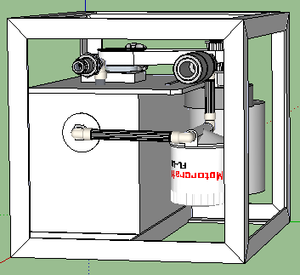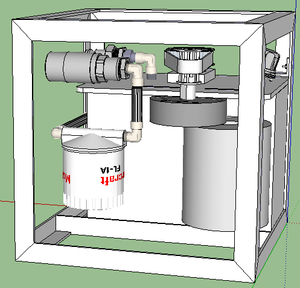Solar Power Cube v17.10
The solar power cube is driven by a solar panel to pump hydraulic fluid with the initial purpose of powering an autonomous tractor for agricultural use.
Specifications
Solar Panel
STC Power Rating 290W PTC Power Rating 263.07W 1 STC Power per unit of area 13.8W/ft2 (148.2W/m2) Peak Efficiency 14.82% Power Tolerances -3%/+3% Number of Cells 72 Nominal Voltage not applicable Imp 8.02A Vmp 36.4V Dimensions: 77.6in (1,972mm) x 39.1in (992mm) x 1.6in (40mm) Weight: 50.7lb (23kg) Hanwha Solar Panel
DC Motor
450W 36 V DC electric motor MY1020z gear reduction Input Voltage: 36 V Base RPM: 450 Wires: 12 Gauge Efficiency: 78% Full Load Amps: 16 Current Type: DC Gear Ratio: 6.67:1 Shaft Diameter: 20 mm (13/16") Motor Body Diameter: 4 1/4" Motor Body Length: 5 1/4" Total Length: 8 1/4" Total Height: 5.65" Mount screw spacing: 4" x 2 1/4" Roller Diameter: 0.3in Roller Width: 0.16in Reversible EBAY MY1020z $67.05
Hydraulic Power Unit
Power 5 HP 3600 RPM Flow 2 GPM max. Pressure 2500 PSI max. Reservoir 1.1 gallons Shaft 1/2" dia. x 7/8" w/keyway Rotation CW Ports 3/8" NPT pressure Return 3/8" & 3/4" NPT Orientation Vertical Size 10" x 10" x 10" Shpg. 13 lbs. Surplus Center Hydraulic Power Unit $109.95
Timing Belt and Pulleys
Hydraulic Motor (for reference)
45.6 cubic inch / revolution Max RPM: 150 Max fluid flow: 30 GPM
Calculations
Power
Max Motor Input: 290 W * 78% * 100 = 226.2 Watts Motor Output: 226 W / (746 W/HP) = 0.303 HP Motor Torque @ 450 RPM = 4.54 ft-lb Torque (ft-lb) = (HP * 33000) / (2 * pi * rotational speed) = (.303 * 33000) / (2 * 3.14159 * 450) = 3.54 ft-lbs Torque (NM) = Watts / (2 * pi * rotational speed) = 226 W / (2 * 3.14159 * 450 RPM) = 0.08 NM These numbers are for the electric motor and will be used to determine pulley and belt specs
RPM input/output
Max electric motor RPM: 450 Max Hydraulic Pump RPM: 3600 Max Hydraulic Motor RPM: 150 Estimated Max Wheel RPM: 1
Hydraulic Fluid Flow
GPM required for 1 RPM @wheel: 45.6 cu in/min or 45.6 / 231 = 0.197 GPM Max Pump Output: 2 GPM @ 3600 RPM => Pump CIPR = (2 GPM * 231 cu in/Gal) / 3600 RPM = 0.128 CIPR (Cubic Inches Per Revolution) RPM required from pump for 0.138 GPM output: (0.197 GPM * 231 cu in/Gal) / 0.128 CIPR = 355 RPM
Pulley and Belt Sizing
The RPM of the electric motor at 36VDC is 450 RPM and must drive the pulley on the hydraulic pump at 355 RPM, so the ratio of pulleys is 450:355 or roughly 1:1.27.
The smaller pulley must accommodate the motor's 20 mm shaft, so its "OD" must be 20mm + 2 * 5mm to allow 5mm thickness to allow for a set screw. According to PolyBelt.com (http://polybelt.com/5mb.php), the smaller pulley must have at least 20 teeth.
Applying the 1:1.27 ratio, this gives us 20:25.4 teeth (round down to 20:25).
The larger pulley goes on the pump and the smaller on the electric motor.
The shaft on the electric motor is 13/16" and the shaft on the pump is 1/2". Both pulleys must be machined for their respective shaft sizes and allow enough material for set screws. The smaller pulley requires an OD of about 30mm to allow for machining, making it a 19 tooth pulley. Applying the pulley ratio, we calculate the size of the larger pulley in teeth:
20 teeth * 1.27 = 25.4 teeth (round down to 25 teeth)
Looking up the pulleys on the vendor webpage shows the following part pages:
20 Tooth Pulley with flanges 25 Tooth Pulley with flanges
They don't seem to carry a 20 tooth pulley without the flanges, so we can purchase the bar stock instead, which we can cut and machine to our specs:
20 Tooth Pulley Bar Stock
This will be better for the smaller pulley, as we need more height to make up for the sort motor shaft.
This yields pulley pitch diameters of 31.83mm and 39.8mm.
The approximate distance between shaft centers is 5.1" (129.54mm)
The "formal" calculation of belt length with different size pulleys is rather complex, but as our pulleys are close and we have an adjustment, we can use a simple approximation for the belt length (d = 5.1" = 129.54mm):
pi * (d1 + d2)/2 + 2 * d = pi * (31.83mm + 39.8mm)/2 + 2 * 115.9mm = 344.3mm (13.55")
Calculate the belt length in terms of 5mm teeth: 344.3 / 5 = 68.9. This is roughly 69 teeth in length of a 5mm pitch belt. Looking it up on vendor's page: Polybelt Timing Belts
We see that the 69 tooth belt has the following web page:
Polyurethane Steel Timing Belt 69 Tooth
Power Cube Working Document
["https://docs.google.com/spreadsheets/d/1KNVP2O3KogC6jyxMuRALWTxrYjyCJ4ChjeZsJVdqHsg/edit#gid=1"]
Files
File:Solar Power Cube V1.0.skp File:Solar Power Cube V1.0 BOM.pdf



